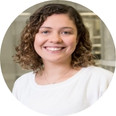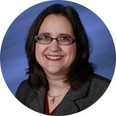LEAD Reverse Mentoring Pair
Bruna Garcia and Melissa A. Hurston
 Bruna Garcia, Reverse Mentor
Bruna Garcia, Reverse Mentor
Bruna Martins Garcia is from Brazil and received her bachelor's degree in biotechnological engineering and a master's degree in molecular biology. For her doctorate, Garcia joined the Max Planck Institute for Biology of Ageing and the University of Cologne in 2019 to study lipid synthesis regulation. Garcia has also been passionate about disseminating science to historically excluded groups. She has been associated with teaching teenagers from areas that historically receive low funding levels. In 2024, she joined the Champalimaud Foundation in Portugal as a postdoctoral researcher to study cancer metastasis.
What new skills do you seek to gain as a reverse mentor?
Garcia: Being a reverse mentor will give me the chance to improve my communication skills with people from different backgrounds and career stages. It would impact my potential to exchange ideas and have a voice to promote my views on how to increase specific scientific research communities that are minorities.
How is mentoring important to your career development?
Garcia: Mentoring is the perfect opportunity to learn and grow in a safe and close environment. I believe mentoring can be a key tool for making science more inclusive and promoting hard discussions about what can be done to improve science and the scientific community. A successful one-to-one mentoring can have a “wave effect” and be the start of important information propagation.
How does diversity and inclusivity impact your leadership style?
Garcia: I have always been interested in disseminating science to historically excluded groups. I was a mentee in the international female mentoring program at the University of Cologne. I also mentored African scientists in a Max Planck Institute program to disseminate training that will increase the inclusion of diverse groups in science. I believe science can change lives not only through new discoveries but also by promoting inclusivity and diversity.
 Melissa A. Hurston, Reverse Mentee
Melissa A. Hurston, Reverse Mentee
Melissa A. Hurston is the director of meetings at the American Society for Pharmacology and Experimental Therapeutics (ASPET), where she is responsible for ASPET’s annual meeting, webinars, and other events. Prior to joining ASPET in 2014, she worked for an association management company handling conferences for dozens of nonprofit clients in a variety of industries, including scientific research, healthcare, banking, timeshares, clean energy, and airlines.
What new skills do you seek to gain as a reverse mentee?
Hurston: My goal is to develop a relationship with someone from a different generation or background than mine to gain new perspectives to help me improve what I do for ASPET.
How is mentoring important to your career development?
Hurston: It’s valuable for me to receive feedback on work style improvements that align better with the next generation of employees and how I can design meetings to appeal to the next generation of scientists.
How does diversity and inclusivity impact your leadership style?
Hurston: I enjoy teams that represent a variety of perspectives and especially value ones that expand my thinking beyond my present assumptions and limited experiences.
Melissa A. Hurston is a member of American Society for Pharmacology and Experimental Therapeutics, a FASEB member society.